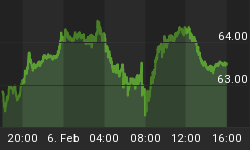News Flow Was Light
Given financial markets have an almost infinite number of moving parts, it can be difficult to pin down why investor tone changes from one day to the next. Monday's big gains came on a slow news day. From The Wall Street Journal:
Shares of smaller companies, meanwhile, staged a recovery from their recent lows. Such companies have fallen out of favor in recent months as investors have flocked to shares of larger, more attractively-priced companies. The Russell 2000 index of small-cap stocks recently advanced 23 points, or 2.1%, to 1130, though it remains 6.5% off its recent high of 1208.65 reached in March. News flow in the stock market was light Monday, with the bulk of the earnings season over and little in the way of major economic data due in the session. Steadily improving economic data and better-than-expected earnings reports are helping to lift stocks, say traders and investors."The fundamentals of the economy are actually improving," said Brendan Connaughton, chief investment officer at ClearPath Capital Partners. "Inflation is not an issue. Valuations, although not attractive, aren't in bubble territory or exceedingly expensive."

Dow Clears Consolidation Hurdle
Regular readers know that sideways action in stocks is symptomatic of investor indecisiveness. The bad news is sideways action can be extremely frustrating. The good news is the longer stocks consolidate, the bigger the move (up or down) that typically follows. For example, fourteen months of frustration was followed by a 37% pop after stocks finally broke out in early 1995.

Fast forward to Monday's session and we see little progress was made in the Dow Jones Industrial Average over the past four months (between points A and B below). The evidence says the period of investor indecisiveness may be coming to an end.

Monday's session was marked by wide participation (breadth), which tells us buyers had more conviction about positive economic outcomes than we have seen in recent weeks. From Reuters:
Gains were broad, with eight of the 10 primary S&P 500 sectors in positive territory. Cyclical groups such as materials and industrials ranked among the day's biggest gainers. The only sectors to decline were utilities and telecom, both considered defensive plays. About 77 percent of stocks traded on the New York Stock Exchange rose, while more than three-fourths of Nasdaq-listed stocks gained. Internet and biotech names were among the strongest advancers of the day.
Consolidations Can Be Resolved In Bullish Manner
A common question on Twitter in recent weeks has been:
"What do you think about the ongoing small cap underperformance?"
It is logical to be concerned when higher-growth companies are shunned by investors since it is indicative of increasing concerns about the economy, earnings, and Fed policy. However, as outlined with a historical example in this week's stock market video, there is no law of the markets that forbids a bullish resolution after an extended period of investor indecisiveness.
Video: Stocks: The Good, The Bad, And The Ugly
Investment Implications - The Evidence Will Guide Us
If you ask a weather forecaster how many days out they can somewhat confidently forecast the weather, the answer typically falls into the 5-8 day range. Then why are 10-day forecasts published on a regular basis? Answer: the public demands them. Just as a meteorologist is constantly revising their weather forecasts as the inputs change, we constantly assess the market's current risk profile based on the latest known information, using our market model. Is it possible that Monday's gains in stocks were the result of short covering? It is, but the fact that most of the gains carried into the close casts some doubt on the "this was just shorts covering" theory. Regardless, Monday was one day. Consequently, we added a relatively small position in industrial stocks (XLI) Monday to incrementally increase our exposure to growth-oriented assets. If the evidence continues to improve, we will adjust accordingly. Conversely, if Monday turns out to be a one-day wonder, we still have some offsetting defensive exposure to bonds (TLT).
Odds Have Improved A Bit
The takeaway from Monday's new high in the Dow is that the odds of good things happening in stocks are a little better today than they were last week. We think in probabilities, which allows us to (a) account for the possibility of a false breakout, and (b) remain flexible in terms of what may happen in the coming days. Tuesday morning brings an important report on retail sales.















